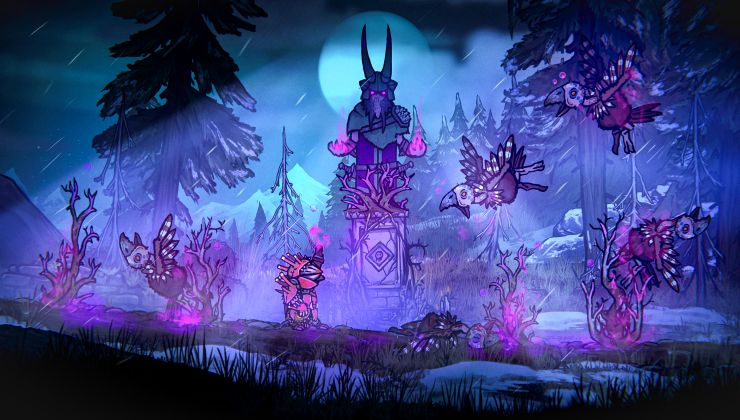With the talk of some big players moving into cloud gaming, along with a number of people thinking Valve will also be doing it, here’s a few thoughts from me.
Firstly, for those that didn’t know already, Google are testing the waters with their own cloud gaming service called Project Stream. For this, they teamed up with Ubisoft to offer Assassin’s Creed Odyssey on the service. I actually had numerous emails about this, from a bunch of Linux gamers who managed to try it out and apparently it worked quite well on Linux.
EA are pushing pretty heavily with this too with what they’re calling Project Atlas, as their Chief Technology Officer talked about in a Medium post on how they’ve got one thousand EA employees now working on it. That sounds incredibly serious to me!
There’s more cloud services offering hardware for a subscription all the time, although a lot of them are quite expensive and use Windows.
So this does beg the question: What is Valve going to do? Cloud gaming services, that will allow people with lower-end devices to play a bunch of AAA games relatively easily could end up cutting into Valve’s wallet.
Enter Valve’s Cloud Gaming Service
Pure speculation of course, but with the amount of big players now moving into the market, I’m sure Valve will be researching it themselves. Perhaps this is what Steam Play is actually progressing towards? With Steam Play, Valve will be able to give users access to a large library of games running on Linux where they don’t have to pay extra fees for any sort of Windows licensing fee from Microsoft and obviously being Linux it would allow them to heavily customise it to their liking.
On top of that, what about the improvements this could further bring for native desktop Linux gaming? Stop and think about it for a moment, how can Valve tell developers they will get the best experience on this cloud gaming platform? Have a native Linux version they support with updates and fixes. Valve are already suggesting developers to use Vulkan, it’s not such a stretch I think.
Think about how many games, even single-player games are connected to the net now in some way with various features. Looking to the future, having it so your games can be accessed from any device with the content stored in the cloud somewhere does seem like the way things are heading. As much as some (including me) aren’t sold on the idea, clearly this is where a lot of major players are heading and Valve won’t want to be left behind.
For Valve, it might not even need to be a subscription service, since they already host the data for the developers. Perhaps, you buy a game and get access to both a desktop and cloud copy? That would be a very interesting and tempting idea. Might not be feasible of course, since the upkeep on the cloud machines might require a subscription if Valve wanted to keep healthy profits, but it’s another way they could possibly trump the already heavy competition.
Think the whole idea is incredibly farfetched? Fair enough, I do a little too. However, they might already have a good amount of the legwork done on this, thanks to their efforts with the Steam Link. Did anyone think a year or two ago you would be able to stream Steam games to your phone and tablet?
Valve also offer movies, TV series and more on Steam so they have quite a lot to offer.
It might not happen at all of course, these are just some basic thoughts of mine on what Valve’s moves might be in future. It's likely not going to happen for VR titles, since they need so much power and any upset with latency could make people quite sick. Highly competitive games would also be difficult, but as always once it gets going the technology behind it will constantly improve like everything. There’s got to be some sort of end game for all their Linux gaming work and not just to help us, they are a business and they will keep moving along with all the other major players.
Also what comes into my mind is the OpenGL passthrough-ish support of KVM...
Is a Vulkan equivalent in the working?
MAinstream gaming on Cloud-Linux-VMs... That this though isn't utterl bullshit... What a time to be alive :)
3D gaming, VR, IoT, and now "cloud gaming," all feel like whiz bang Here-Comes-the-Future-and-Ain't-it-Neato developments having less to do with actual technological advancements and more to do with some marketing director's quarterly bonus.
And long gone are the days where Google's involvement was a reason for me to get excited. If Google's doing it, they're just looking for more data. Besides, nowadays Google feels less like the Queen of innovation and more like the Burgomeister of false starts and dead-end dreams. And that cloud gaming's other big player is EA---voted how many times the Most Evil Company in America?---tells me all I need to know about this thing.
I'm not saying there's nothing worth reporting here, nor that it's impossible that "cloud gaming" won't be the next big thing. I'm just saying I'm not thrilled at the prospect of corporations looking to yet another method of insinuating themselves into my personal life. Hope Valve holds off a while longer.
Last edited by Nanobang on 1 Nov 2018 at 11:47 am UTC
Steam's streaming is making a game you bought and run on your own device available to other, lesser potent devices at home. That's convenience. It's still possible to mod the game, run it through a modern port or whatever you wish to do. Spectator streams just split audio and video to third parties, but the single player is still in control, only his or her input is used to interact with the game streamed to everyone else connected.
You can put Steam into offline mode and play any installed games without someone else knowing when you play which game for how long. Good luck doing the same on a platform that forces always online by design.
Yes, I can see the benefits for players just giving a game they are interested in a test drive before they buy. Or players without access to mid to high end gaming rigs having an option to play the game on devices that are incapable of running the code on their own. But I still think those walled gardens cloud platforms essentially are are harmful for the industry as a whole.
The biggest problem for a gaming cloud service is that it requires a very low latency with a good bandwidth (you are almost don't allowed to have any buffering, which means that video streaming will get quite heavy). So, with the current state of networks and amount servers farm, we still need to work a lot to achieve this requirements (at least in the 95% of the countries in the world).
But yeah, eventually in will become a reality and Linux will be running these gaming server.
One side note: for complex competitive games (pubg, csgo, etc.) moving all the game to the cloud will simplify a lot (if not completely remove them) the anti cheat software. I think that this feature would be quite seductive for such games.
Spoiler, click me

It didn't quite work for OnLive, although Sony bought them and now have this thing I've never even heard about. If they leave the streaming service as an option, it's fine by me. Considering the wide range of game prices and their quality, I imagine there could be different tiers like "basic", "indie", "AAA" or such with different minute/hour price. At least because they could optimize the hardware and power consumption based on the game you're gonna play, some cheap integrated Intel card is enough to run Rimworld but you'll need a beefy GTX for Tomb Raider, Serious Sam or Prey. So that + per minute (or hour) tariff + regional prices + play any¹ game without purchasing = could be pretty competitive.
________
¹ not really any but from those participating in this program, could be slightly dated games (2-3 years old) to boost profits because it's easier to start playing instantly without downloading and installing anything.
In the end cloud streaming suffers from latency, so I won't be really paying anybody for renting games.
Not all games suffer that much from latency though, and I even succeeded playing a mission in Saints Row 3 on a GPD WIN with about 1..3FPS (winning from a bunch of zombies).
So I want to be able to do it, my way, on hardware I have available (or rent).
I would really love Valve to make cloud streaming possible for users doing it themselves...Uhhhh, you already have home streaming, why not use that? For internet that might be tricky but I succeeded with tap VPN, played Dying Light from work on my home PC using this feature. You just need to setup OpenVPN or any other software so that it provides a tap adapter (L2) and setup the IPs from the same network on both sides. No routing/gateways needed, it's all fully "transparent" for any program, broadcast just works etc. so Steam thinks you're on the same LAN and allows to stream.
In the end cloud streaming suffers from latency, so I won't be really paying anybody for renting games.
Not all games suffer that much from latency though, and I even succeeded playing a mission in Saints Row 3 on a GPD WIN with about 1..3FPS (winning from a bunch of zombies).
So I want to be able to do it, my way, on hardware I have available (or rent).
Last edited by Beamboom on 1 Nov 2018 at 12:29 pm UTC
If it will be open source I will certainly support it.
For those who don't want to spend the money on a proper PC, this would certainly be a solution.
On the other hand, some countries are already struggling to give their citizens proper internet - something like this will make it even harder (heavy bandwidth requirements no doubt).
Honestly , if games move to Streaming as a model it's end of the line.
A lot of old games get harder to run on news OSes , then you have things like online activation servers or play servers , but you could work around those if fans make a back engineered server.
If we move full on to streaming games will only exist in the ether as a brief thing for a few years before a company shuts them down completely and permanently.
This is just shit.Solid feedback, thanks.
As for myself I don't see cloud gaming going take off so well. People internet not up to code or so many with a limit cap does not make cloud gaming to much a go as right now.
Exactly, even if you have a internet connection capable of streaming 1080p content at 60fps, it would very quickly fall victim to download caps.
Last edited by cdnr1 on 1 Nov 2018 at 2:54 pm UTC
Think about how many games, even single-player games are connected to the net now in some way with various features.
The problem with this in the past is quite evident... and one of the major companies involved in the new cloud effort (EA) was the worst offender.
Other than possibly a high score board, what features are actually wanted from the internet?
There are racing and FPS games that have been known to contact the internet in order to download new billboard graphics regularly. Of course these are used to sell in game advertising... ok if a title is free to play, but it has been used in purchased games.
We all know of the hundreds of games that require "activation servers" in order to check the licenses while playing. But the reality is that people that pirate games apply a patch to remove the activation code, while the people that are legitimate users are screwed when they have internet connection issues and can't play the game they want to legally use. In addition, if the company decides to turn off activation servers, there is nothing you can do (other than get the pirated version.) There have been titles that EA in particular has turned off one year after a release leaving a player unable to play... (usually after a sequel is released.) In some cases people buying old titles from "bargain bins" are unable to play the game due to buying after the servers were taken down.
And lets just say that the less said about the remake of Simcity the better. It "required" constant internet access from even the single player content. The game servers were overloaded at launch making it a horrible experience. It was later revealed that the online requirement was a forced requirement having no actual bearing on playing the game. (Thanks EA!!)
I'm no fan of "the" cloud in general as it continues the trend of further eroding control of what otherwise would be one's personal property.
Just quickly want to chime in here: Games/software are not your personal property. You may own a physical medium the game/software is on though, which is your property. But you still need a license to use that copy.
So, games and software are licensed. Even FOSS software. Otherwise, you would own the right to them, which you do not.
I get what you wanted to say here, though. And I agree, when owning a physical copy without DRM probably nobody is gonna bother you in the future, to take it away or prevent you from playing it.
On the other hand, marketing works, so drm sells. I think that regarding games, movies etc. it is not actually for screwing crackers (because there was no kind of drm that really worked), but for screwing the customers.














 How to install GE-Proton on Steam Deck, SteamOS, Linux
How to install GE-Proton on Steam Deck, SteamOS, Linux An idiots guide to setting up Minecraft on Steam Deck / SteamOS with controller support
An idiots guide to setting up Minecraft on Steam Deck / SteamOS with controller support
See more from me